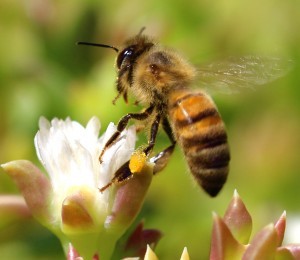24
Jul
UK Approves Emergency Application for Neonicotinoid Seed Treatment Use Despite Moratorium
(Beyond Pesticides, July 24, 2015) An emergency application was approved by the UK Department for Environment, Food, and Rural Affairs (DEFRA) on Wednesday that allows farmers to use neonicotinoid seed treatment on 5 percent of oilseed rape crop (known as canola in the U.S.) this summer to control a flea beetle infestation. The emergency use, which has been granted for 120 days, allows growers to use Bayer CropScience’s Modesto (clothianidin) and Syngenta’s Cruiser OSR (thiamethoxam). The active ingredients of these products belong to a class of toxic chemicals knowns as neonicotinoids, which have been linked to pollinator decline.
 The request was the second one for the National Farmers Union (NFU) after the first request for a nationwide lifting of the two-year moratorium on neonicotinoid use was rejected. The NFU said it was “frustrated” at having to put
The request was the second one for the National Farmers Union (NFU) after the first request for a nationwide lifting of the two-year moratorium on neonicotinoid use was rejected. The NFU said it was “frustrated” at having to put
in an application for a smaller area.
There have been numerous attempts to shroud the application process in secrecy. DEFRA told its expert committee on pesticides (ECP) to halt its normal practice of publishing the minutes of meetings at which the neonicotinoid applications were discussed, in order to avoid “provoking representations from different interest groups.” Additionally, according to the Guardian, the UK government gagged its own pesticide advisors after they refused to support an application by NFU to lift a ban on neonicotinoids. The gag is intended to prevent campaigners from lobbying ministers on the issue.
Neonicotinoids have been found by a growing body of scientific literature to be linked to honey bee and pollinator decline. The European Commission voted to suspend the use of neonicotinoid pesticides in 2013 for two years. The ban came several months after the European Food Safety Authority (EFSA) released a report identifying “high acute risk” to honey bees from uses of certain neonicotinoid chemicals. However, this action was opposed by the UK government. Despite this opposition, Britain was required to comply with the ban under European Union (EU) rules.
The acceptance of NFU’s emergency request is alarming, especially in light of numerous reports indicating the lack of efficacy of neonicotinoid use. A report released by the US Environmental Protection Agency (EPA) last year found that soybean seed treatments with neonicotinoid insecticides provide little or no overall benefits in controlling insects or improving yield or quality in soybean production. EPA’s report confirms scientific findings that these chemical treatments are unnecessary and inefficacious. Another report, from the Center for Food Safety, found that neonicotinoids either did not provide a yield benefit or provided inconsistent yield benefits.
In 2014, Syngenta applied for an emergency application in the UK and was met with massive public outcry and protest, which ultimately led to the chemical industry giant withdrawing its request. In the US, earlier this year, EPA granted Florida citrus growers an emergency exemption to use the bee-killing pesticide clothianidin to control Asian Citrus Psyllid (ACP), a pest that causes “citrus greening,” a devastating citrus plant disease.
Beyond Pesticides has long advocated a regulatory approach that prohibits high hazard chemical use and requires alternative assessments. Although EPA announced a moratorium in April on new bee- and bird- harming neonicotinoid pesticide products and uses, farm, beekeeper and environmental groups, including Beyond Pesticides have urged EPA to also suspend the huge numbers of other bee-harming pesticides already on the market. We suggest an approach that rejects uses and exposures deemed acceptable under risk assessment calculations, and instead focuses on safer alternatives that are proven effective, such as organic agriculture, which, of course, prohibit the use of neonicotinoids. See how you can help through Bee Protective.
All unattributed positions and opinions in this piece are those of Beyond Pesticides
Source: Farmers Weekly and The Guardian










